
One of the most pressing consequences of climate change is the water crisis; indeed water is at the center of the climate crisis. Water issues are increasing in magnitude and severity worldwide, and affects health and wellbeing in far-reaching ways. Even though water is a human right addressed in Sustainable Development Goal (SDG) 6, “Clean Water and Sanitation for All”, we are still struggling to fully grasp the impact of the water crisis on peoples´ daily lives.
As part of the effort to understand the consequences of water insecurity, and the closely related concept of food insecurity, experts from 40 different organizations throughout Latin America and the Caribbean (LAC), and globally -- governments, NGOs, development banks, UN entities, and universities--convened April 20-21, 2023, at Universidad Iberoamericana, in Mexico City. The focus of the meeting, co-hosted with Mexico’s National Institute of Public Health and several universities, was water and food insecurity. This international event fostered research collaborations, fueled policy debates, and garnered wide support to tackle water insecurity.
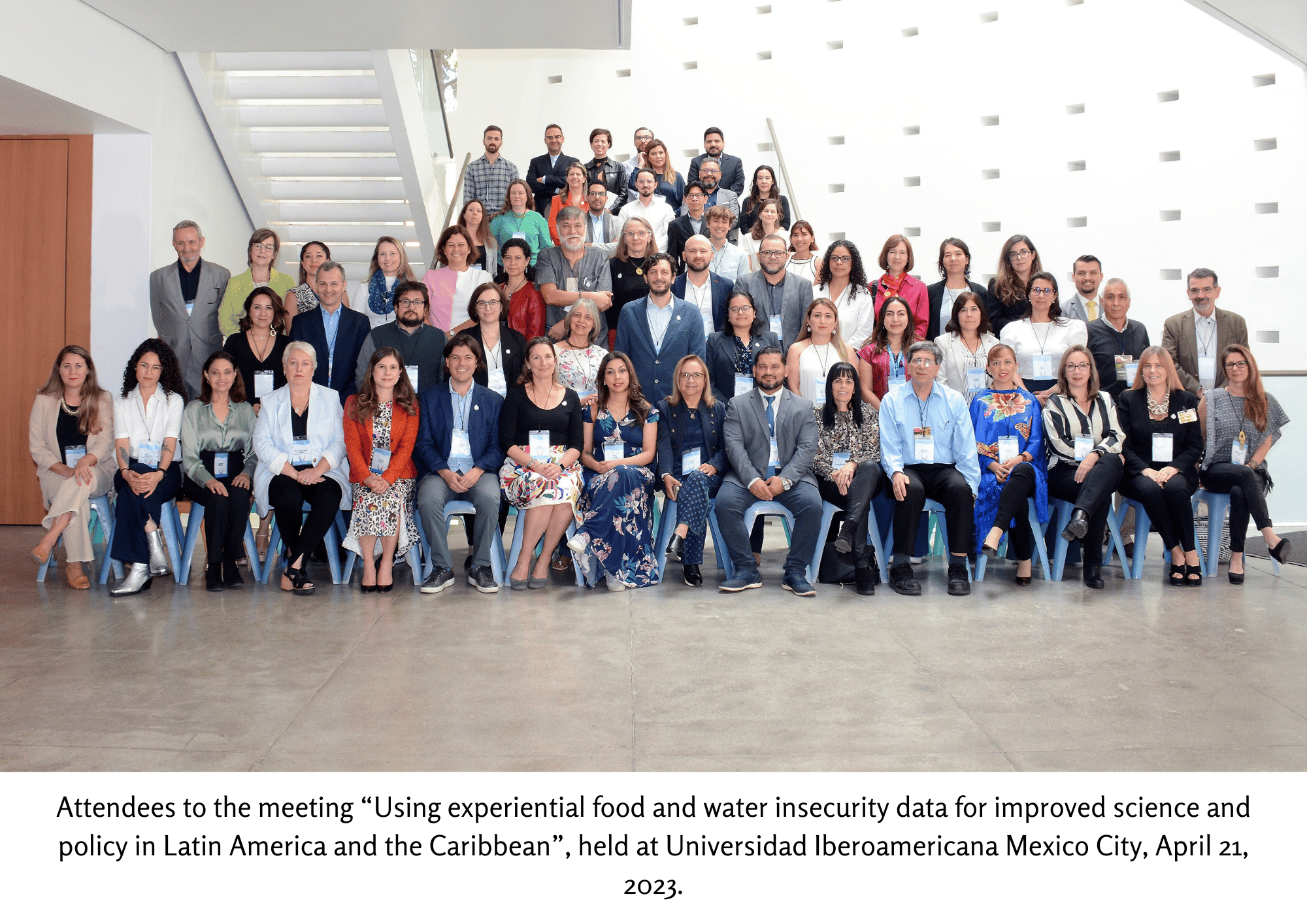
Several presentations highlighted the importance of addressing various dimensions of water insecurity beyond those which are physically observable, i.e., availability, access, use, and stability. One way to achieve this is by expanding the use of the Water Insecurity Experiences (WISE) Scales, measurement instruments recognized as valuable for policy because they reliably and equivalently quantify issues related to water access for human consumption and for basic domestic needs. The WISE scales share the conceptual and technical underpinnings of the Food Insecurity Experience scale (FIES), sponsored by FAO and currently used to monitor progress on SDG 2 “Zero hunger”.
A key outcome of the Mexico City meeting was a consensus vote on a Declaration expressing commitment to improving our understanding of the experiences of water insecurity in LAC. The attendees agreed to collaborate between universities, with international organizations, policymakers, and government representatives to promote a more holistic approach to understanding and mitigating water insecurity. The Declaration has been published by the International Journal for Equity in Health in English, Spanish and Portuguese, and is available at [https://doi.org/10.1186/s12939-023-01956-w].
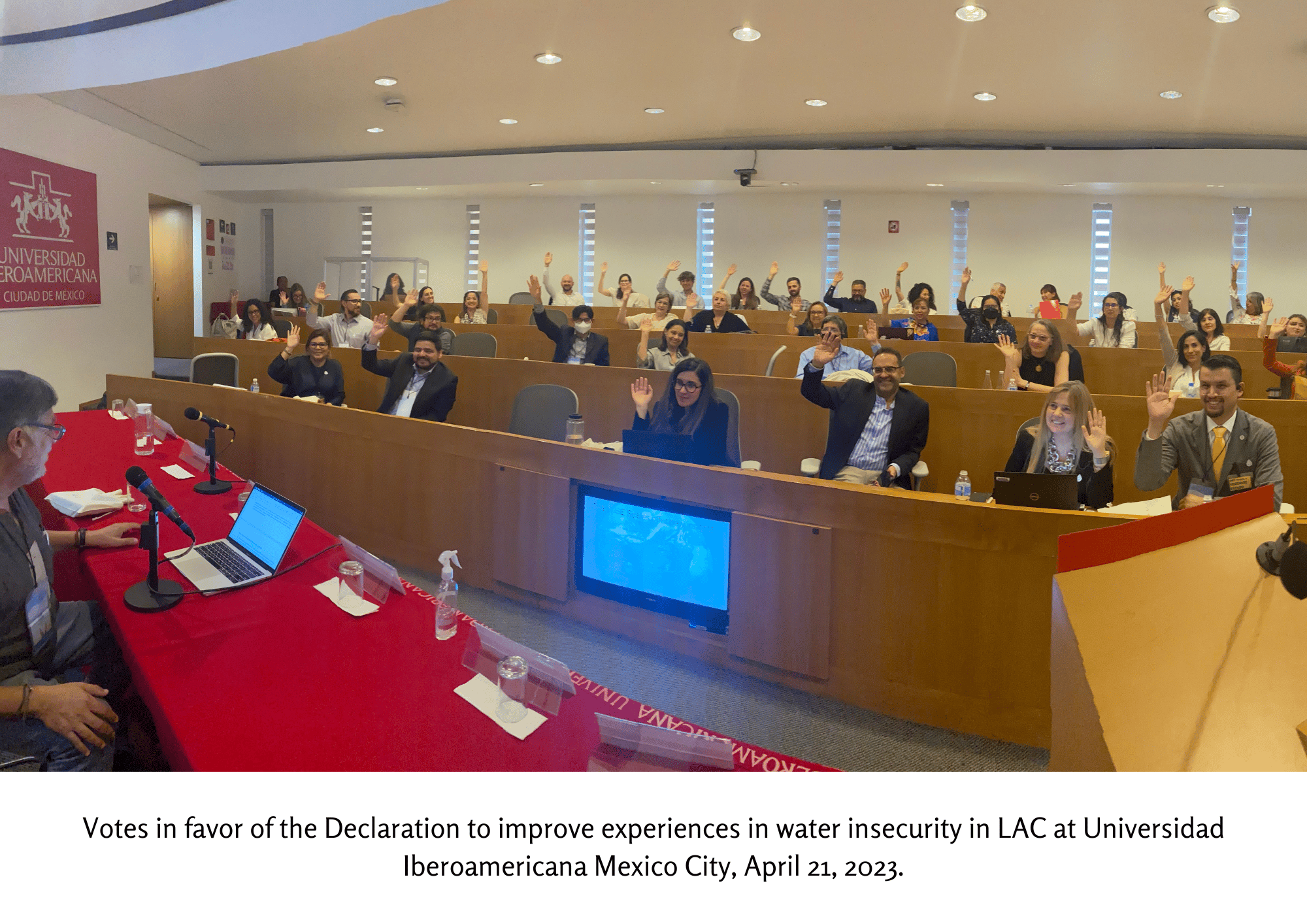
Promising results from the April 2023 meeting are emerging even a few months later. A WISE-LAC network was formalized to share knowledge and collaborate on research opportunities. This is an open network, and everyone is welcomed to join by sending an email (wise.lac@ibero.mx) or completing this form. The network will generate and send out newsletters to the network affiliates every several months; contributions from all members are welcome. Members of the network are also hosting seminars on issues like water insecurity and climate change and training sessions on innovations in WASH measurement at Stockholm World Water Week. They are also starting research initiatives, as with the Buffett Institute of Global Affairs at Northwestern University, amongst others. A regional research project on the Household-WISE is taking place in seven Latin American countries (Mexico, Panama, Colombia, Peru, Brazil, Uruguay and Argentina).
Local governments are also changing their practices based on the recommendations from the April Mexico City meeting. The government of the Mexican state of Nuevo León is innovating in using the WISE scales to target and monitor social programs. The state’s Governor also signed an agreement to collaborate with the WISE-LAC network. The agreement acknowledged how improving water security will likely have an impact on health, well-being, education, and gender equity, among others. WISE-LAC network members will work with the government to design better ways to reduce household water insecurity.
Signatories of the agreement between the WISE-LAC network and the Nuevo León Government to collaborate on water insecurity at the Government Palace of Nuevo Leon, July 4, 2023.
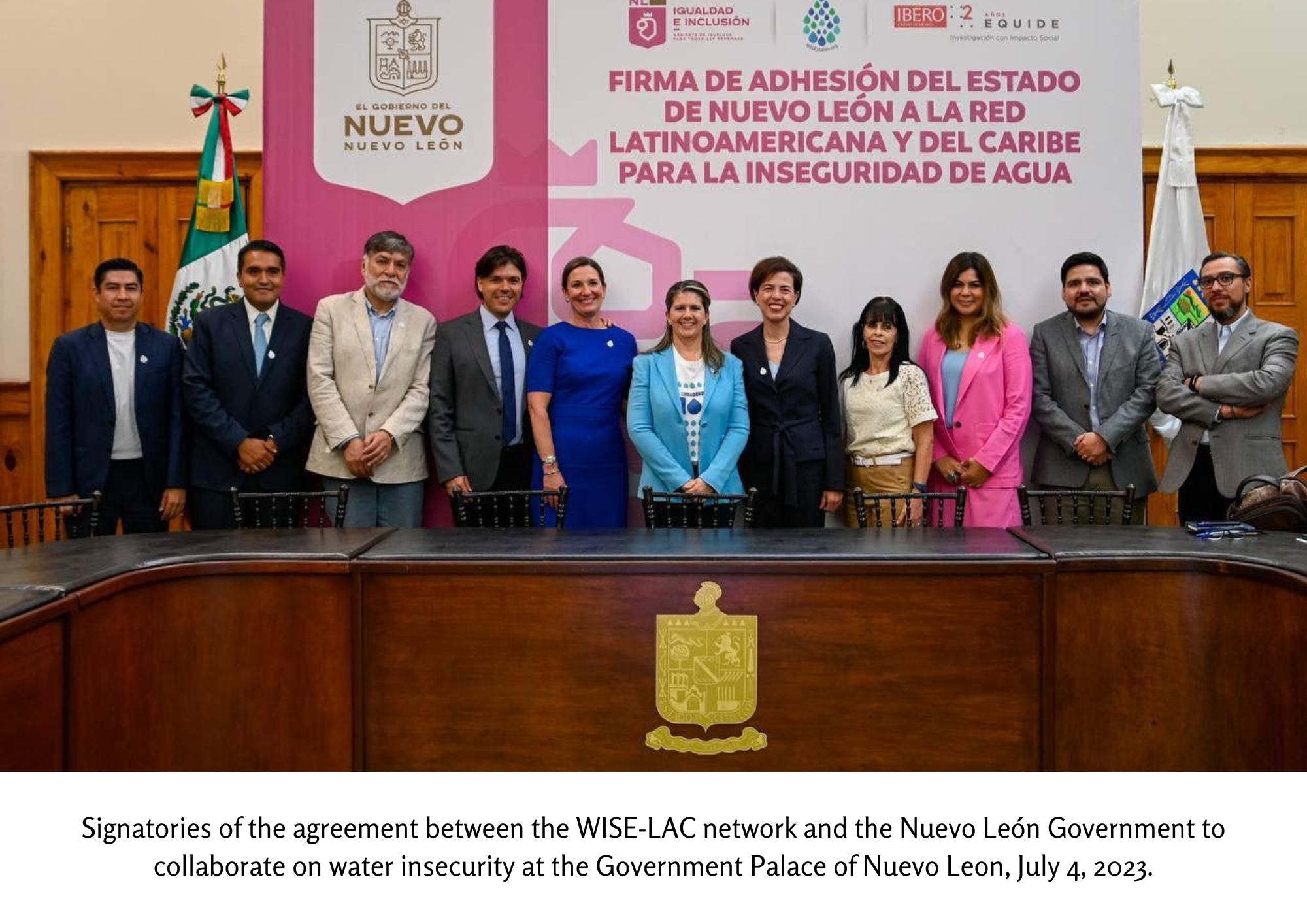
Water is a precious and limited resource necessary for our very existence. Echoing the Declaration on water insecurity, let´s prioritize water and work together to support the sustainable progress towards the full realization of the human right to water. Time is running out.
Follow the Topic
-
International Journal for Equity in Health

This journal presents evidence relevant to the search for, and attainment of, equity in health across and within countries and publishes research which improves the understanding of issues that influence the distribution of health and healthcare within populations.
What are SDG Topics?
An introduction to Sustainable Development Goals (SDGs) Topics and their role in highlighting sustainable development research.
Continue reading announcementRelated Collections
With Collections, you can get published faster and increase your visibility.
Racism and Health
The ongoing advancement of our understanding of how racism impacts health - both directly and structurally - is crucial for addressing the deep-rooted health inequities that persist globally. Structural racism shapes health outcomes among racialized populations, contributing to inequities in healthcare access and quality, and impacting social, political, or environmental determinants of health. Existing research also connects direct and visible manifestations of racism, such as major and everyday discrimination, to negative health outcomes. At the same time, racism does not operate in isolation. A growing body of research shows how it intersects with other systems of oppression—such as classism and patriarchy—and with broader social determinants of health, producing compounded and context-specific inequities. An intersectional lens is therefore essential to understand how overlapping structures of power and exclusion shape health and healthcare experiences. These insights are essential in conducting rigorous and thorough health research, guiding anti-racist health policy, and ultimately, ensuring equitable health for all.
Looking forward, research holds the potential to develop new methodologies and indices and unveil complexities in how racism manifests within healthcare systems and societal structures. By deepening our collective understanding, we can develop more effective interventions that target the root causes of health inequities.
We invite researchers to contribute to this special Collection on Racism and Health, focusing on advancing our understanding and addressing health inequities. Topics of interest include but are not limited to:
- Racism as a structural determinant of health
- Racism as a direct determinant of health
- Racialized health outcomes in different populations
- Intersectionality and inequities in health, healthcare access and quality
- Nexuses between social, political, and environmental determinants of health and systemic discrimination
- Anti-racist health policy frameworks and systems
- Impact of racism on mental health
- Health inequities in reproductive, maternal, and child health
- Obstetric and reproductive violence
- Community-based interventions for equitable health
- Decolonizing health research and global health epistemologies
We strongly encourage contributions from racialized scholars and authors with lived experience or expertise in addressing systemic discrimination in health research.
This Collection supports and amplifies research related to SDG 3, Good Health and Well-Being and SDG 10, Reduced Inequalities.
All submissions in this collection undergo the journal’s standard peer review process. Similarly, all manuscripts authored by a Guest Editor(s) will be handled by the Editor-in-Chief. As an open access publication, this journal levies an article processing fee (details here). We recognize that many key stakeholders may not have access to such resources and are committed to supporting participation in this issue wherever resources are a barrier. For more information about what support may be available, please visit OA funding and support, or email OAfundingpolicy@springernature.com or the Editor-in-Chief.
Publishing Model: Open Access
Deadline: Aug 14, 2026
Mental Health Inequities in Crisis: Insights from South-East Asia
The importance of advancing our collective understanding of mental health disparities during extraordinary crises, particularly in South-East Asia, cannot be overstated. As the region faces a multitude of challenges—ranging from natural disasters to public health emergencies—there is a pressing need to explore the variations in mental health impacts across different communities. Significant strides have been made in this area, including the identification of specific risk factors, the implementation of culturally sensitive interventions, and the recognition of mental health as a critical component of overall well-being. However, much work remains to be done. Future research has the potential to uncover new insights into the social determinants of mental health, enhance intervention strategies, and inform policies that promote equity. By deepening our understanding of these issues, we can better address the unique mental health challenges faced by vulnerable populations in the region.
We welcome all article types, including original research, reviews, meta-analyses, and perspectives.
We invite researchers to contribute to this special Collection. Topics of interest include but are not limited to:
-Socioeconomic & Geographic Disparities in Mental Health Access
-Community-Level Heterogeneity in Mental Health Outcomes
-Social Determinants of Mental Health in Crisis Contexts
-Culturally Adapted Mental Health Interventions
-Youth Mental Health in Crisis: Vulnerability and Resilience
-Gender and Mental Health: Differential Impacts and Responses
-Stigma, Barriers, and Facilitators to Mental Health Care
-Digital Mental Health Innovations in Low-Resource Settings
This Collection supports and amplifies research related to SDG 3, Good Health and Well-Being.
All submissions in this collection undergo the journal’s standard peer review process. Similarly, all manuscripts authored by a Guest Editor(s) will be handled by the Editor-in-Chief. As an open access publication, this journal levies an article processing fee (details here). We recognize that many key stakeholders may not have access to such resources and are committed to supporting participation in this issue wherever resources are a barrier. For more information about what support may be available, please visit OA funding and support, or email OAfundingpolicy@springernature.com or the Editor-in-Chief.
Publishing Model: Open Access
Deadline: Jul 30, 2026
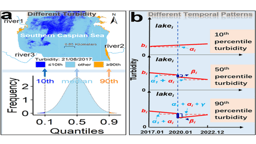

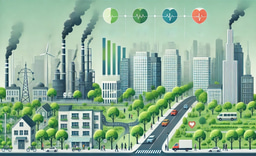
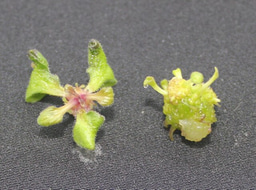
Please sign in or register for FREE
If you are a registered user on Research Communities by Springer Nature, please sign in
Dear Pablo and colleagues,
thank you for your summary of the backgrounds and the meeting in Mexico City. I am very much interested in the Declaration you mention, unfortunately, the link does not work for me and I could not find it elsewhere. Could you please check it or provide another source? Thank you!
Best regards
Anna
Dear Anna,
Thank you for your interest in the Declaration. We appreciate your message and are glad to hear about your enthusiasm for the topic.
We’re not sure why the link did not work for you, but we are happy to share it again here: https://equityhealthj.biomedcentral.com/articles/10.1186/s12939-023-01956-w.
Additionally, we invite you to join the WISE-LAC Network to stay connected and receive updates on related initiatives. You can join through this link: https://northwestern.us1.list-manage.com/subscribe?u=72adc4a52b41faa16985eef9e&id=4b06a7fc5a
Please let us know if you encounter any issues accessing it, and we’ll be happy to assist you further. For any questions or further information about the network, you can also reach us at wise.lac@ibero.mx
Best regards,
Pablo Gaitán